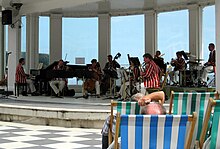
Back موسيقى خفيفة Arabic Lehká hudba Czech Gehobene Unterhaltungsmusik German Light music Finnish Musique légère French Թեթև երաժշտություն Armenian 軽音楽 Japanese მსუბუქი მუსიკა Georgian 경음악 Korean Lichte muziek Dutch
| Light music | |
|---|---|
 The Scarborough Spa Orchestra, the last surviving professional seaside orchestra, giving a concert of light music in August 2009. | |
| Stylistic origins | |
| Cultural origins | 18th century – 19th century |
| Derivative forms | |
Light music is a less-serious form of Western classical music, which originated in the 18th and 19th centuries and continues today. Its heyday was in the mid‑20th century.[1][2] The style is through-composed, usually shorter orchestral pieces and suites designed to appeal to a wider context and audience than more sophisticated forms such as the concerto, the symphony and the opera.
Light music was especially popular during the formative years of radio broadcasting, with stations such as the BBC Light Programme (1945–1967) playing almost exclusively "light" compositions.
Occasionally also known as mood music and concert music, light music is often grouped with the easy listening genre.[3] Light music was popular in the United Kingdom, the United States and in continental Europe, and many compositions in the genre remain familiar through their use as themes in film, radio and television series.
- ^ Geoffrey Self, Light Music in Britain Since 1870: A Survey (Ashgate, 2001)
- ^ Lamb, Andrew (2002). British light music: sound good, feel good, Gramophone November 2002, pp.34–38, accessed 12 September 2011.
- ^ Scott, Derek B. (2004), "Other mainstreams: light music and easy listening, 1920–70", in Cook, Nicholas; Pople, Anthony (eds.), The Cambridge History of Twentieth-Century Music, Cambridge University Press, pp. 307–335, doi:10.1017/chol9780521662567.014, ISBN 9781139054003, retrieved 17 April 2019
© MMXXIII Rich X Search. We shall prevail. All rights reserved. Rich X Search